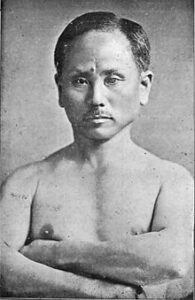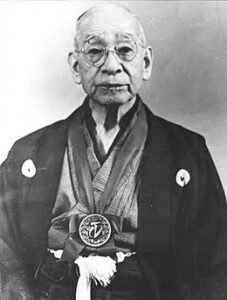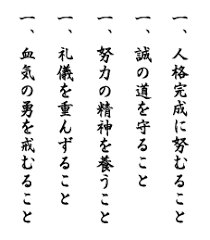The creator of Dojo Kun.


While it is difficult to say for certain who the creator of the Dojo Kun principles was, it is widely accepted that the Dojo Kun principles that are commonly recited in modern Karate schools were developed by Gichin Funakoshi, the founder of Shotokan Karate. Choshin Chibana, the founder of Shorin Ryu Karate, also used the same Dojo Kun principles in his style of Karate.
Some say, that Sakugawa Kanga’s teachings and philosophy influenced the development of the Dojo Kun principles, but there is no concrete evidence to suggest that he was directly involved in their creation.
Regardless of their origins, the Dojo Kun principles remain an important part of Karate practice and are widely recognized as reflecting the values and attitudes that are important for students to cultivate as they train in this martial art.
It is worth noting that the exact wording and phrasing of the Dojo Kun principles may vary slightly between different styles and schools of Karate, but the underlying principles remain the same.
The five principles of Shotokan/Shorin-Ryu Dojo Kun are:

Seek perfection of character (Hitotsu, jinkaku kansei ni tsutomuru koto): This principle emphasizes the importance of self-improvement and personal growth through the practice of Karate. It encourages practitioners to strive for excellence in all areas of their lives and to cultivate a strong sense of self-discipline and self-control.
Be faithful (Hitotsu, makato no michi o mamoru koto): This principle stresses the importance of honesty, integrity, and loyalty in all aspects of life. It encourages practitioners to always act with sincerity and to be true to their word and their commitments.
Endeavour (Hitotsu, doryoku no seishin o yashinau koto): This principle emphasizes the importance of hard work, perseverance, and dedication in the pursuit of one’s goals. It encourages practitioners to always strive for their best and to never give up in the face of obstacles or challenges.
Respect others (Hitotsu, reigi o omonzuru koto): This principle emphasizes the importance of showing respect and courtesy to others, regardless of their age, rank, or background. It encourages practitioners to treat others with kindness and consideration and to always be mindful of the feelings and needs of those around them.
Refrain from violent behavior (Hitotsu, kekki no yu o imashimuru koto): This principle emphasizes the importance of using Karate only for self-defense and never for aggression or violence. It encourages practitioners to always seek peaceful solutions to conflicts and to avoid using their skills to harm others unnecessarily.
These principles serve as a guide for practitioners to develop not only their physical skills but also their mental and spiritual qualities. They are an integral part of the practice of Shotokan Karate and are often considered to be as important as the physical techniques themselves.
Thanks for reading.
Gert
